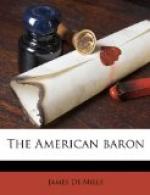But he was not one who could long remain inactive. Feeling confident that the brigands were scattered every where in headlong flight, he sent his men out in different directions, into the woods and along the shore, to see if they could find any traces of the lost ones. He himself remained near the house, so as to direct the search most efficiently. After about an hour they came back, one by one, without being able to find many traces. One had found an empty coffin in a grave, another a woman’s hood, a third had found a scarf. All of these had endeavored to follow up these traces, but without result. Finally a man approached who announced the discovery of a body on the shore of the lake. After him came a party who was carrying the corpse for the inspection of their captain.
The Baron went to look at it. The body showed a great gap in the skull. On questioning the men, he learned that they had found it on the shore, at the bottom of a steep rock, about half-way between the house and the place where they had first emerged from the woods. His head was lying pressed against a sharp rock in such a way that it was evident that he had fallen over the cliff, and had been instantly killed. The Baron looked at the face, and recognized the features of Girasole. He ordered it to be taken away and laid in the empty grave for future burial.
The Baron now became impatient. This was not what he had bargained for at all. At length he thought that they might have fled, and might now be concealed in the woods around; and together with this thought there came to his mind an idea of an effective way to reach them. The trumpeter could send forth a blast which could be heard far and wide. But what might, could, would, or should the trumpeter sound forth which should give the concealed listeners a certainty that the summons came from friends and not from foes? This the Baron puzzled over for some time. At length he solved this problem also, and triumphantly.
There was one strain which the trumpeter might sound that could not be mistaken. It would at once convey to the concealed hearers all the truth, and gently woo them home. It would be at once a note of victory, a song of joy, a call of love, a sound of peace, and an invitation—“Wanderer, come home!”
Of course there was only one tune that, to the mind of the Baron, was capable of doing this.
And of course that tune was “Yankee Doodle.”
Did the trumpeter know it?
Of course he did.
Who does not know it?
All men know that tune. Man is born with an innate knowledge of the strain of “Yankee Doodle.” No one can remember when he first learned it. The reason is because he never learned it at all. It was born in him.
So the trumpeter sounded it forth, and wild and high and clear and far the sounds arose; and it was “Blow, bugle, blow, set the wild echoes flying; and answer, echoes, answer, Yankee Doodle dying.”




